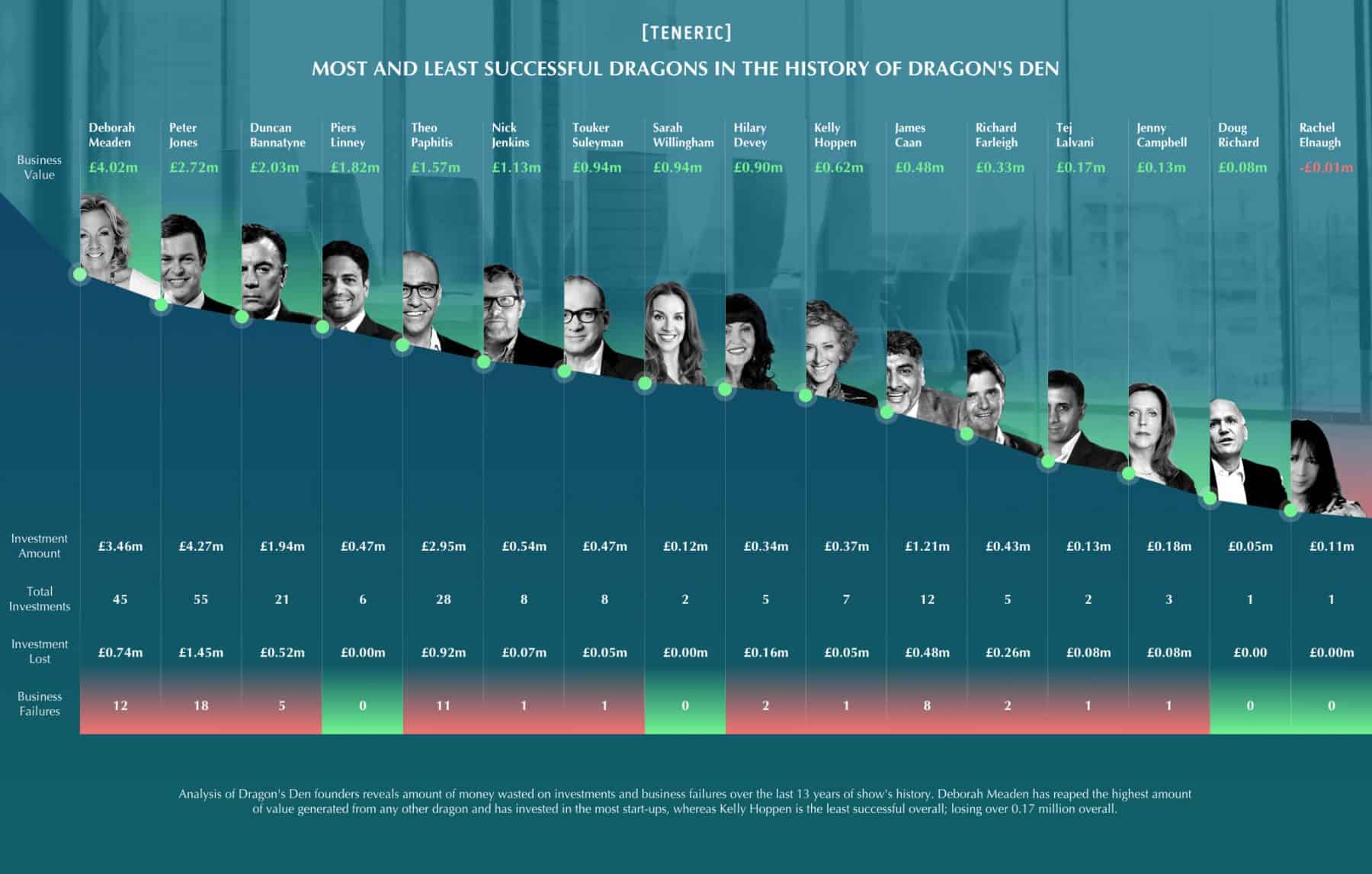
We analysed 13 years’ worth of businesses that came out of either Dragons’ Den or The Apprentice to find out which show generates the most success for founders.
According to The Telegraph [1], a staggering 660,000 new businesses are registered in the UK every year. That’s the equivalent of 70 new businesses formed every hour.
However, 60% of those new businesses will go under within three years, and 20% will close their doors within just 12 months of starting out.
It’s no wonder that budding entrepreneurs head to shows like Dragons’ Den and The Apprentice in the hopes of giving their business the best chance of success. After all, both shows offer the investment of time, money and expertise if the entrepreneur wins over a Dragon or Lord Sugar. But just how much value does getting investment really give the founders?
Business planning experts Teneric analysed the history of The Apprentice and Dragons’ Den, to find out which show provides the best deal for business owners – the results are interesting.
Failed businesses versus highest earners – which show gives the best chance of startup success?
Collectively, the shows have invested in 247 businesses which have gone on to make over £20million in total, all together the Dragons and Sugar have invested over £13.6million.
When analysing the data, Dragons’ Den may have made more money from their investments achieving an incredible £11.9 million. However, this is a result of investing in a total of 238 businesses, whereas Lord Sugar has invested in just 9 businesses overall.
Both Dragons and Lord Sugar have shelled out millions of pounds, with Dragons investing the most but seeing less return.
| TV Show | Total Net Worth | Investment Total |
|---|---|---|
| The Apprentice | £8,308,577 | £2,250,000 |
| Dragons’ Den | £11,976,319 | £11,396,500 |
| Total | £20,284,896 | £13,646,500 |
According to the data, entrepreneurs have less chance of making serious money if they receive an investment from one of the dragons in comparison to Sugar.
Nearly a third of Dragons’ Den founders enter employment following failed business ventures
The analysis shows that over a third (35%) of Dragons’ Den start-up founders are forced back into employment following business failure. Just under a third of all start-ups who received dragon investment then dissolve, whereas The Apprentice has an astonishing 0% failure rate according to Companies House data.
£7.3 million worth of investments were promised, but never went through
According to the study, £7,316,000 worth of investments were promised by Dragons on-air, but the deals fell through after the cameras cut.
These are the top ten highest investment deals that fell through after the show aired.
| Contestant Name | Year & Series | Investment | Investors | Product |
|---|---|---|---|---|
| Michael Cotton | Series 6 – 2008 | £250,000 | Theo Paphitis & Deborah Meaden | DDN Ltd |
| David Lees | Series 2 -2006 | £225,000 | Theo Paphitis & Duncan Bannatyne | Mode Al |
| James Halliburton | Series 5 – 2007 | £200,000 | Peter Jones & Theo Paphitis | Water Buoy |
| Richard Blakesley & Chris Barnardo | Series 8 – 2010 | £200,000 | Duncan Bannatyne | The Wand Company |
| Ross Gourlay | Series 12 – 2014 | £200,000 | Peter Jones & Duncan Bannatyne | Nae Danger |
| Guy Unwin & Caroline Kavanagh | Series 6 – 2008 | £200,000 | James Caan | Planit Products |
| Charles Ejogo | Series 1 – 2005 | £150,000 | Duncan Bannatyne & Peter Jones | Umbrolly |
| Richard Lee & Daren Duraidi | Series 3 – 2006 | £150,000 | Duncan Bannatyne | Dr Cap |
| Jason Roberts | Series 7 – 2009 | £150,000 | Peter Jones & Theo Paphitis | Tech21 |
| Ashley Sayed | Series 10 – 2012 | £150,000 | Peter Jones | Karuma Innovations |
Table 1 shows the top investments that didn’t go through from Dragons’ Den over the past 13 years.
Which are the most successful businesses to ever come out of Dragons’ Den and The Apprentice?
Out of the 247 businesses which received investment across both shows, those which performed the best long-term came from The Apprentice.
We found the top most successful businesses from both Dragons’ Den and The Apprentice and the results were quite surprising.
The top ten businesses from Dragons’ Den
| Contestant name | Company | Net worth |
|---|---|---|
| Asi Sharabi & David Cadji-Newby | Lost my Name | £1,293,454 |
| Christian Richardson & Rachel Watkyn | Tiny Box | £1,292,154 |
| Marc Wileman | Sublime Science | £977,475 |
| Liz & Alan Colleran | Raskelf Memory Foam (Duvalay) | £791,730 |
| Peter Moule | ElectroExpo, Chocbox | £637,019 |
| Andy Jefferies & Ben Muller | Dock & Bay | £634,397 |
| Gurminder & Rashpal Dhillon | Boot Buddy | £348,391 |
| Kirsty Henshaw | £Worthenshaw’s | £319,291 |
| Rob Tominey & Aden Levin | Mainstage Travel | £312,767 |
| Ian Helmore | Steri Spray | £288,051 |
Table 2. Show the top ten Dragons’ Den success stories.
Now called Wonderbly, the most successful investment from Dragon’s Den was backed by Piers Linney and has since gone on to sell in excess of one million books worldwide.
Over five years later the company is still going from strength to strength and has a net worth of over £1.2million.
The top Apprentice success stories overal
| Contestant name | Company | Net worth |
|---|---|---|
| Susan Ma | Tropic Skincare | £4,626,033 |
| Thomas Pellereau | Stylideas Ltd. | £1,117,061 |
| Ricky Martin | Hyper Recruitment Solutions | £1,029,176 |
| Leah Totton | Skin Clinic | £661,644 |
| Mark Wright | Climb Online | £442,626 |
| Sarah Lynn | Sweets in the City | £264,099 |
| James White | Right Time Recruitment | £167,938 |
Shows the top Apprentice success stories.
Despite placing third on the show in 2011, Susan Ma founder of Tropic Skincare is the most successful contestant to ever come out of the boardroom.
Sugar revealed on You’re Hired shortly after the final that he would be investing in Susan. The business has since gone on to have a net worth over £4.6 million.
Who are the most (and least) successful dragons?

Why Deborah Meaden is the best dragon to partner with
According to the study, Deborah Meaden is the most successful dragon of all. In the last 13 years, she has invested in 45 start-up businesses. Despite 12 of those businesses failing, those that continue to thrive are now worth a whopping £4 million – this is the highest amount of value generated from any dragon.
However, Piers Linney as a sole investor has reaped the most success above any other – earning over £1.8million in just six investments.
The least successful dragon is Peter Jones. Although he has invested in the most businesses, 55 during his time on Dragons’ Den 18 of those have failed. As a result of this, he has personally lost £1.4 million.
Whereas Lord Alan Sugar has invested in 9 businesses as a result of the show spending £2.25million in investments but has generated a total worth of £8.3million, averaging £920,000 per business.
So, what does this tell us about the reality business shows?
You’re better off getting your business backed by Sugar due to its consistently low failure rate and high net worth yield. With over £7.3 million worth of investments never going through, appearing and successfully getting investment in Dragons’ Den could leave entrepreneurs feeling left out in the cold.
Sources and Methodology:
Methodology
We analysed each company’s net assets using balance sheets from Companies House. Where we couldn’t find a value from Companies House, we used Company Check as the source. Any figures that were not available have been discounted.
Total investments all categories relating to individual dragons and the investment amount is based on the total value of investments each dragon was part of. As we are unable to know what % individual dragons ended up contributing.
Greatest losses this data is based on the sum of companies status now categorised as “dissolved”.
Data Sources:
- [1] The Telegraph company data
- A full breakdown of the data can be found here.
- https://www.gov.uk/government/organisations/companies-house
- https://companycheck.co.uk/
- Wikipedia Dragons’ Den
- Wikipedia The Apprentice